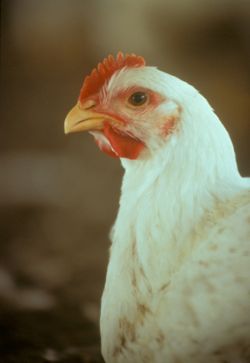 |
With as much as 30,000 tons of American poultry in the pipeline to Russia, the government in Moscow imposed a ban on future U.S. poultry imports on New Year’s Day.
Russia joins the European Union in prohibiting the use of chlorine as an anti-microbial treatment in poultry production, which is commonly used in the United States.
As for birds in the pipeline, USA Poultry and Egg Export Council President Jim Summers said he thinks based on earlier assurances from the Russian Veterinary Service that poultry in transit will be allowed to enter.
The U.S. Department of Agriculture defended the use of chlorine by the American poultry industry.
“Since chlorine has been used as an anti-microbial treatment for more than 25 years, this resolution effectively blocks U.S. exports of poultry to Russia, has a devastating impact on the U.S. poultry industry and trade, and raised the costs of poultry products for Russia’s consumers,” says USDA spokeswoman Katie Gorscak.
She said there is overwhelming scientific evidence that chlorine is safe and effective as a disinfectant for poultry.
American poultry exports to Russia are the biggest component of U.S. agricultural exports to the former Soviet Union. Since the fall of the Iron Curtain, Russia has grown to become American’s tenth largest Ag export market for a total of $1.8 billion in 2008. Poultry was almost half of that amount.
Losing another near billion-worth of exports to Russia over chlorine comes as the Office of the U.S. Trade Representative has also been unable to open the EU to U.S. poultry for the same issue. For trade disputes with the EU, complaints go to the World Trade Organization (WTO). But, Russia is not a member of WTO.
In 2009, Russia accepted poultry from the U.S. under a quota lowered from 2008 levels. Russia’s domestic poultry industry has improved greatly over the past few years, but experts say the country will still need U.S. birds to meet the demands of its consumers.
The EU ban on bathing chicken in chlorine has been in effect since 1997. The US-EU dispute was a test case for the Transatlantic Economic Council, which was formed in 2007 to facilitate trade and business between the two economies. A plan to end the ban was vetoed by EU veterinary experts.
The U.S. and Russia plan to hold technical talks over the chlorine issue. As written, there is more chlorine in most U.S. public water systems than Russia would allow for chicken baths.
by Dan Flynn
Jan 07, 2010
Source: Food Safety News